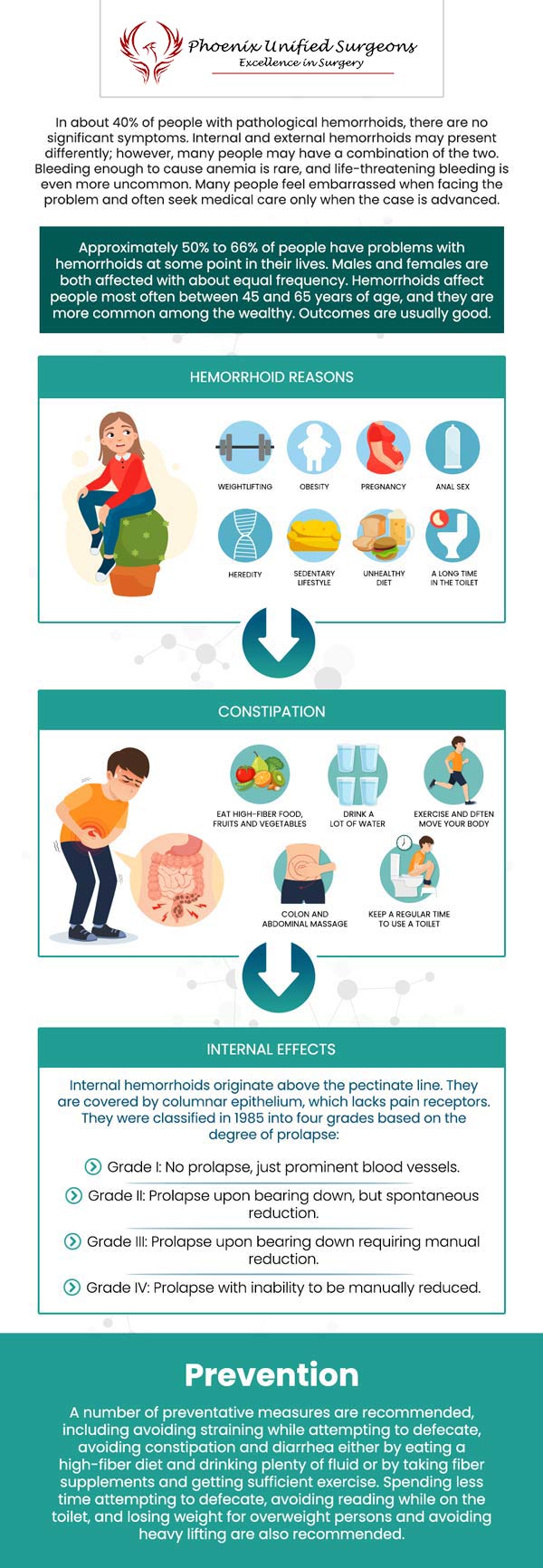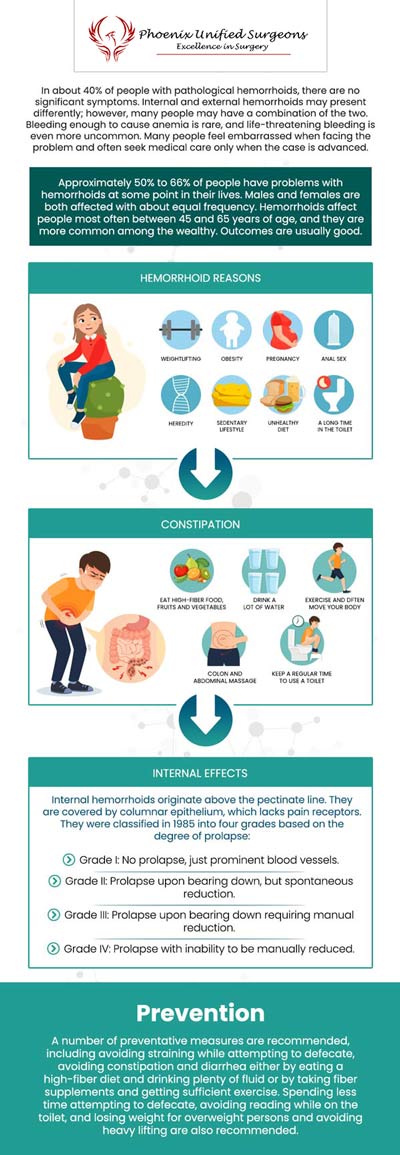Hemorrhoid Surgery Specialist in Phoenix, AZ
Hemorrhoids are quite prevalent. Discomfort is a typical symptom, particularly after bowel motions or when sitting. Other symptoms include itchiness and bleeding. Consult with the board-certified surgeons at Phoenix Unified Surgeons to determine your choices for hemorrhoid treatment. Please contact us or book your appointment online. Our office is conveniently located at 20333 N 19th Avenue, Ste 230 Phoenix, AZ 85027.




Table of Contents:
What is a hemorrhoid?
Why would someone have a hemorrhoid surgery?
What are the advantages of hemorrhoid surgery over other hemorrhoid treatments?
What is the average recovery time for a hemorrhoid surgery?
In the realm of human ailments, hemorrhoids stand out as common yet enigmatic entities. These swollen or inflamed blood vessels, likened to varicose veins in our limbs, reside within the lower rectum and anus. They manifest in two distinct forms: internal hemorrhoids, nestled within the rectum’s interior, and external hemorrhoids, protruding around the anal opening.
Hemorrhoids are far from strangers to our population, affecting an astonishing number of adults – nearly half – throughout their lives. Their genesis often lies in the excessive pressure exerted upon the lower rectum, attributable to a myriad of factors. Straining during bowel evacuations, prolonged periods of sitting, the weight of pregnancy or obesity, and even the exertion of heavy lifting can all contribute to the development of hemorrhoids.
Commonly, hemorrhoids announce their presence through a range of symptoms, including pain, the discomfort of itching, and bleeding during bowel movements. Bright red blood stains on toilet paper or in the toilet bowl may serve as telltale signs. Furthermore, they can manifest as lumps or swelling encircling the anus.
While hemorrhoids can undoubtedly cause significant discomfort, they are generally not life-threatening and often respond favorably to non-invasive treatments and prudent lifestyle adjustments. Increasing the consumption of dietary fiber, ensuring adequate hydration, and engaging in regular physical activity can all prove beneficial in alleviating hemorrhoid symptoms. However, in certain cases, medical interventions may become necessary to eradicate or reduce the size of hemorrhoids that remain unresponsive to conservative measures. For those experiencing excruciating pain, substantial bleeding, or persistent symptoms, seeking prompt medical advice is essential for an accurate diagnosis and tailored treatment plan.
Hemorrhoid surgery may emerge as an indispensable intervention when conventional remedies falter in alleviating severe hemorrhoidal distress. These swollen veins residing within the lower rectum or anus can manifest as internal or external protrusions, imposing significant discomfort, bleeding, and inflammation.
While over-the-counter creams, warm baths, and dietary modifications often suffice in managing hemorrhoids, certain extraordinary circumstances may necessitate surgical intervention. These include:
• Intractable Pain and Discomfort: Excessive pain and discomfort that persists despite conservative treatments may warrant surgical excision to alleviate the unrelenting agony.
• Excessive Bleeding: Profuse bleeding from hemorrhoids can lead to significant blood loss and anemia, necessitating timely surgical removal to control the hemorrhage and ensure the patient’s well-being.
• Prolapsed Hemorrhoids: Hemorrhoids that protrude outside the anus, known as prolapsed hemorrhoids, can cause severe discomfort and interfere with daily activities. Surgery may be indicated to reposition or remove these prolapsed hemorrhoids, restoring the anal canal’s normal function.
• Thrombosed Hemorrhoids: External hemorrhoids that develop a blood clot, termed thrombosed hemorrhoids, can inflict excruciating pain and impede bowel movements. Surgical removal of the clotted hemorrhoid is often the preferred treatment to alleviate the discomfort and restore normalcy.
• Failed Conservative Treatments: When all conservative treatment options have been exhausted without providing substantial relief, surgery may be considered as the final resort to eliminate the hemorrhoids and restore the patient’s quality of life.
Surgical interventions for hemorrhoids vary, with hemorrhoidectomy being the most prevalent. This procedure involves the surgical excision of the hemorrhoids using precision tools or lasers. Hemorrhoid stapling is another surgical option that repositions or shrinks the hemorrhoids, offering a less invasive alternative to hemorrhoidectomy.
For individuals suffering from severe or chronic hemorrhoids, hemorrhoid surgery offers a definitive and transformative solution. Unlike other treatment options, surgery tackles the root cause by directly removing the hemorrhoidal tissue. This significantly reduces the risk of recurrence, particularly for patients with large hemorrhoids or those who haven’t found success with conservative methods like creams or medications.
Hemorrhoid surgery goes beyond symptom control. It provides rapid relief from debilitating pain, persistent itching, and bothersome bleeding, which can significantly impact daily life. While there may be some temporary discomfort during recovery, most patients find the long-term benefits outweigh any short-term inconvenience.
Compared to other treatments, surgery provides superior results. Band ligation, for example, offers temporary relief and requires weeks to see effects. Surgical procedures, on the other hand, typically resolve the issue within days, offering immediate and lasting improvement.
Therefore, for individuals struggling with severe, treatment-resistant hemorrhoids, hemorrhoid surgery stands as a beacon of hope. Its ability to provide long-term relief, rapid symptom resolution, and superior results compared to other treatments makes it the definitive solution for a hemorrhoid-free future.
Hemorrhoid surgery, a procedure known as hemorrhoidectomy, valiantly tackles swollen veins plaguing the rectal and anal passages. The duration of the rehabilitative process depends upon both the individuality of the patient and the type of intervention employed.
A traditional hemorrhoidectomy typically demands a recovery period of 4 to 6 weeks. Initially, patients may grapple with substantial pain and distress, particularly during bowel evacuations. To alleviate this discomfort, medical practitioners often prescribe pain-relieving remedies.
Adherence to post-operative instructions is paramount, including the therapeutic use of sitz baths, a fiber-rich dietary regimen, and ample hydration to facilitate bowel movements. Common experiences during the healing phase include pain, inflammation, occasional bleeding, and challenges with defecation.
For less invasive procedures such as rubber band ligation or sclerotherapy, the recovery time is considerably shorter. Rubber band ligation may induce discomfort for a few days, yet most individuals resume their routine activities within a couple of days. Sclerotherapy, which entails the injection of a solution to diminish hemorrhoids, typically requires a recovery period of a few days to a week. Patients may experience temporary itching and discomfort.
On average, individuals undergoing less invasive treatments may require only 1 to 2 weeks of respite from work or regular pursuits.
Full recovery from hemorrhoid surgery spans approximately 4 to 6 weeks, during which heavy lifting and strenuous exertions should be diligently avoided to avert complications. Minor bleeding, itching, or discomfort may persist for a few weeks following the surgical intervention.
Regular follow-up appointments with the treating physician are imperative to ensure proper healing and promptly address any concerns or queries. Despite the initial discomfort during the recovery phase, the vast majority of patients experience significant alleviation of hemorrhoidal symptoms upon complete healing.
Our board-certified surgeons have vast expertise in identifying and treating hemorrhoids. If you have hemorrhoid issues in Phoenix, AZ, visit Phoenix Unified Surgeons. Please contact us or book your appointment online. Our office is conveniently located at 20333 N 19th Avenue, Ste 230 Phoenix, AZ 85027. We serve patients from Phoenix AZ, Sun City AZ, Peoria AZ, Surprise AZ, Glendale AZ, Scottsdale AZ, and surrounding areas.
Check Out Our 5 Star Reviews



Additional Services You May Need
▸ Colon & Rectal Surgery
▸ Gallbladder Surgery
▸ Colonoscopy
▸ Wound Care
▸ Hernia Repair
▸ General Surgery
▸ Robotic and Minimally Invasive Surgery
▸ Appendectomy
▸ Colon Repair/Resection
▸ Lipoma & Cyst Removal
▸ Endoscopy and Colonoscopy
▸ Abdominal Pain
▸ Colon surgery for Diverticulitis
▸ Colon surgery for Colon Cancer
▸ Hemorrhoids
▸ Anal Fistulas
▸ Anal Pain Surgeries
▸ Colostomy Avoidance Surgery
▸ Fecal Incontinence Surgery
▸ Crohn’s Surgery
▸ Ulcerative Colitis Surgery






